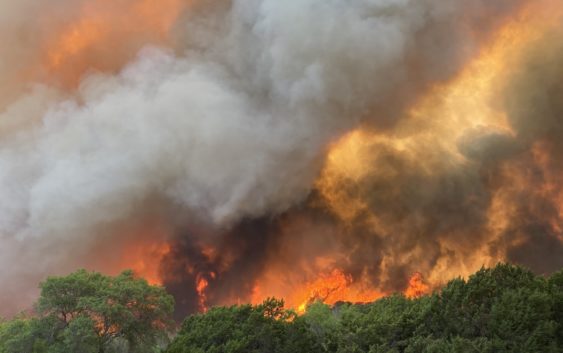- Charlotte-based marketing agency announces $20,000 Creative Campaign Grant to help communities after Hurricane Helene
- Artists transform hurricane aftermath into hoop-inspired masterpieces at Charlotte exhibit
- NC's cost for Hurricane Helene damage is nearly $60 billion, state says
- State to develop drone program to better respond to disasters like Helene, Florence
- South Carolina residents face deadline to get storm debris out to the curb after Hurricane Helene
Wildfire Potential Continues For Portions Of The State

There is potential for large wildfires to occur in the Western/Eastern Hill Country and Rolling Plains through May 20, including areas near Childress, Vernon, Abilene, Brownwood, Lampasas, San Angelo, Ozona and Fredericksburg.
Any new fires in grass and brush vegetation will likely be resistant to control, as underlying drought and critically to extremely dry vegetation combine with 100-degree temperatures and periods of elevated to critical fire weather.
On May 17, Texas A&M Forest Service fire resources responded to four wildfires that burned 10,610 acres across the state. Crews also continued work on carryover fires and responded to two fires that rekindled and moved across containment lines.
Several wildfires exhibited extreme fire behavior caused by dry live and dead vegetation, increased wind speeds and triple-digit temperatures. Fire crews experienced high resistance to control with active crown fire in juniper and mesquite vegetation, where the fire transitions from the surface to the canopy.
Very hot temperatures and mostly dry conditions during the week will decrease live and dead fuel moisture in vegetation through May 20 for much of the state. A general trend of increasing wildfire activity is likely for Central, East and South Texas.
By the weekend, a pattern change is expected when a forecast cold front moves through the state. As a result, a seasonable cool and moist fire environment will limit potential for wildfire activity on May 21-22.
Wildfire resources standing by
“Minimal rainfall, hot and dry conditions, and an intensifying drought continue to support wildfire activity across the state,” said Wes Moorehead, Texas A&M Forest Service fire chief. “Due to conditions, these wildfires are requiring more time and resources to contain. Texas A&M Forest Service continues to support local fire departments and has situated additional resources to the areas of concern.”
Several wildfires, including the Mesquite Heat Fire in Taylor County, are still actively burning across the state. Approximately 9,613 acres, the wildfire prompted evacuations, road closures and has destroyed structures. At this time, the number and type of structures is unconfirmed, and a post-fire assessment team has been mobilized to assess the damage.
In Wilbarger County, fire crews responded to the Coconut Fire. The fire is approximately 25,000 acres and exhibited extreme behavior due to hot, dry conditions and increased winds. A thunderstorm developed near the fire area, causing erratic winds and a sudden change in fire behavior.
A downburst from the thunderstorm caused the fire to erupt, and impacted personnel working the fire. One firefighter was injured, receiving burns from radiant heat. The individual was taken to the hospital where they were treated and released. No other firefighters were injured.
“Our thoughts are with the injured firefighter. Wildland firefighting is an inherently dangerous job and incidents such as this highlight that,” said Emily Wall, Texas A&M Forest Service chief operating officer of Forest Resource Protection. “The priority for Texas A&M Forest Service has been, and will always be, the safety of both the public and first responders.”
Preparation continues
Texas A&M Forest Service is monitoring the current situation closely and has positioned personnel and equipment across the state for a quick and effective response to any requests for assistance.
Fully staffed task forces and additional suppression equipment are staged across the state. Additionally, 123 personnel from other states are currently in Texas to support wildfire response efforts.
Aircraft were heavily utilized to support suppression efforts on the ground, aiding in the protection of structures and other valuable resources.
Twenty aviation resources are currently staged in state, including two large air tankers, 12 single engine air tankers, three air attack platforms, two Type 1 helicopters and one Type 3 helicopter. All aviation resources were committed to and working on wildfires.
Two strike teams are mobilized via Texas Intrastate Fire Mutual Aid System, TIFMAS. Texas A&M Forest Service has requested the mobilization of eight additional strike teams for wildfire incident support.
Stay wildfire aware. If a wildfire is spotted, immediately contact local authorities. A quick response can help save lives and property.
For current conditions and wildfire outlook, visit the Texas Fire Potential Outlook at https://bit.ly/3kemhbG.
Texas A&M Forest Service does not own any aviation resources but instead uses federal aviation contracts through the U.S. Forest Service and Bureau of Land Management for all firefighting aircraft.
Leighton Chachere